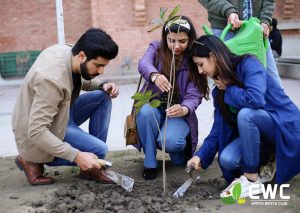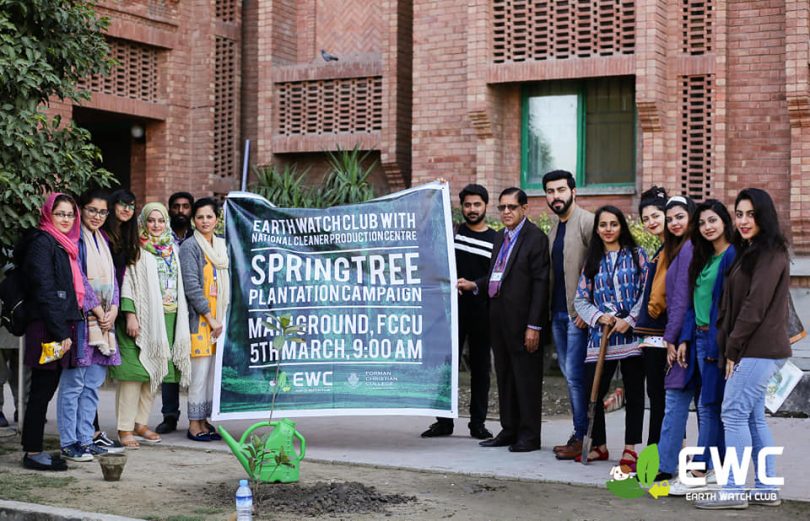By Annie-Mei Forster & Hamish Lindsay, with assistance from Ameera Wyne, Fatima Turabi and Kashaf Gulraiz
Germanwatch lists Pakistan at number seven of countries most likely to be affected by global warming.
To combat the onset of global warming and its impact, Pakistan’s Prime Minister Imran Khan started the 10 Billion Tree Tsunami project late last year.
The 10 Billion Tree Tsunami project is a government initiative to plant millions of trees across Pakistan.
The 10BTT is a follow up to the Billion Tree Tsunami initiative started by the provincial government of Khyber Pakhtunkhwa (KPK) which borders Afghanistan to promote sustainable forestry development and create jobs.
The 10BTT aims to further expand on this success in combating the effects of deforestation and pollution by involving all four provinces.

Students of Forman Christian College, Lahore plant a tree on Thursday, Mar. 4, 2019. This is part of the 10 Billion Tree Tsunami which aims to provide Pakistan with a greener tomorrow. (Earth Watch Club Facebook page)
The Forestry, Environment and Wildlife Department in KPK has been involved in this project, and officer Junaid Khan said the goal was to “bring nature back to its beauty”.
“Climate change is important for Pakistan as we are amongst the countries which emit a very low amount of carbon but are greatly being affected by the phenomenon of climate change,” Mr Junaid Khan said.
The original project was considered a success by Mr Junaid Khan, with 900,000 fast-growing eucalyptus trees planted on what were previously arid hills in the region of Heroshah.
Climate change is a threat to Pakistan, but University of Otago’s Centre for Science Communication senior lecturer Fabien Medvecky said public awareness of climate change issues are low compared to other countries, mostly due to limited coverage by local news media.
In western media environmental issues are covered regularly and often have dedicated journalists, but in Pakistan there are few specialised environmental journalists.
Dr Medveckys report titled ‘Climate change news reporting in Pakistan’ illustrates Pakistani journalists focus on political news, while in western countries climate change is a political issue.
Environmental coverage is often relegated to junior journalists and given little airtime.
“S” Stories | Episode 10 | Saving Our Planet | WWF Pakistan | Sophiya Anjam
Watch a special episode of The “S” Stories as we talk to the team of WWF Pakistan about Climate Change, Environment, Wildlife Protection & how we can bring a…
The 10 Billion Tree Tsunami project has sparked interest on social media with locals hoping it will restore some of the forests that have been stripped.
Not all responses to the project have been positive and Mr Junaid Khan said that people have criticised the project “for their own political gain”.
Dr Medvecky said there are “on-going social issues” in Pakistan that contribute to this criticism, largely due to a pronounced urban and rural divide.
“The recent gender equality marches say something about the increasing voices of urban youth, but it’s less likely to be an issue of concern for those in rural regions,” Dr Medvecky said.
Many schools and universities across Pakistan are getting involved in the 10BTT project, including Forman Christian College in Lahore.
Last month the Earth Watch Club, an environmental action group from Forman Christian College, held their ‘Spring Tree Plantation Campaign’ where many students and staff were involved in planting trees on campus.
Hashtags, such as #plantforpakistan and #greenpakistan have appeared on Twitter creating a sense of community and growing interest in the reforestation cause.
sarahdrama on Twitter: “What a lovely day to be at @KarachiLitFest! Stop by and get your plant at the @KElectricPk stall, #PlantForPakistan! 💚 pic.twitter.com/O1Qju4TO6C / Twitter”
What a lovely day to be at @KarachiLitFest! Stop by and get your plant at the @KElectricPk stall, #PlantForPakistan! 💚 pic.twitter.com/O1Qju4TO6C
According to Dr Medvecky it’s too early to say whether the 10BTT project in Pakistan will be a success as the trees are still being planted, but the project is symbolically important for a country that is vulnerable to the impacts of climate change.
Pakistan faces many challenges in its fight to reduce emissions, due to its long-lasting legacy of political instability and problems with radical Islamists.
Only time will tell if Mr Imran Khan’s 10BTT project will take root and grow the country’s economy and environment.
(Featured Image: Earth Watch Club Facebook page)



